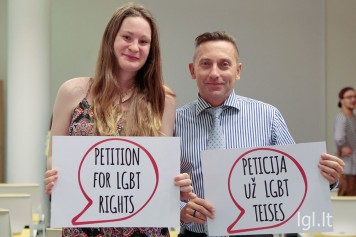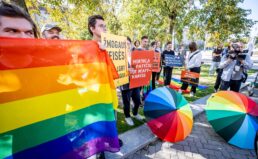Icelandic transgender rights activist Ugla Stefanía Jónsdóttir continues to define the challenges faced by transgender individuals across Europe.
Which specific difficulties transgender teenagers have to confront?
It must be really difficult to be transgender in Lithuania, because of the aforesaid law you have and the hatred towards transgender teenagers. The things that young people face when they learn they’re transgender are overwhelming. It can be devastating to go through puberty and know that this body isn’t the body that you want. For example, it’s probably one of the most devastating things for a transgender girl to start to get a beard.
I think the hardest thing for teenagers is physical change, because they have no control of it. This is why health care is so important, because in certain countries teenagers can get hormone blockers to slow down puberty and its effects, so that once they get older they can make a decision on actual hormone therapy or surgeries. It’s extremely difficult for teenagers in countries where this isn’t possible. Also, it can be extremely supportive to get parents to recognize their gender identity.
It pretty much always comes down to access to the health care that they need. I don’t think that there’s anything more devastating than going through a puberty that you don’t want for transgender individuals. When you’re under eighteen you cannot do anything without parents allowing you to. So it’s always an issue, because even in countries where there is access to hormone blockers parents have to give a permission to do that anyway.
There’s always pressure from the outside, too. There’s the constant issue of people being bullied at school because of their gender identity or their expression of how they look or how they talk. I think this group is especially vulnerable. Research has shown that transgender youth has extremely high suicide rates. It’s really devastating when the situation is as bad as it is in Lithuania, where you have laws forbidding so many things. The situation must be awful for transgender teenagers here.
How does coming-out enrich a transgender individual?
For me, from a personal point of view, when I was able to come out and be who I am it was my chance to be a person. Before that I always felt like I was trying to be somebody that I was not. It’s like trying to put up an act and trying to be this person that you’re not, so you’re never going to be happy as a person. For me it was about being alive, because at one point it was either about coming-out or not living at all.
So I think the most important thing for transgender individuals is getting a chance to be themselves and live the life that they want. It’s really important to get a chance to be who you are and being able to be a person. Nobody should have to live as someone they’re not. And it doesn’t matter if we’re talking about transgender people or someone else. Being able to come out gives you a life.
Could you please share your best practices to gain the attention of the transgender community?
We did not have a lot of representation until 2007 in Iceland, but then a specific transgender group was founded. That was one of the major steps for the transgender community in Iceland. It was not until 2007 that they included our group to the national LGBT* organization.
This means getting people from different LGBT* groups into the board and talking about how these issues are related. A lot of people thought that the issues of sexuality and gender identity are not related and should be separate. But these things are internally connected for they have discrimination in common. What we did was that we offered specific support groups, organized regular meetings, trained our staff.
It’s about getting people knowledgeable about these things, because transgender individuals don’t feel welcome when an organization is not trans-inclusive. It was extremely important to train the staff and include transgender people in the staff as well and get transgender individuals on the boards of the national LGBT* organization.
Were transgender people willing to do that?
Originally, in 2007, when this was being presented and when they wanted to make it to the LGBT* organization everyone did not agree. Actually, there was a huge division in the organization, but fortunately it got through. But even though it was difficult for a few years it was put in place officially.
But it was not until the last two years that we had proper representation on board and people in the national organization actually focused on these things. So it takes a very long time to get it there but you have to start somewhere. So what we did for a start was that we founded this transgender group and decided what we wanted. The transgender community needs to be organized and figure out what are the main points that they need to do and focus on.
Referring to the transgender situation, what particular achievements of LGBT* right activists in Iceland are you most proud of?
We had the first legislation pact in Iceland which is related to transgender people. I think this was one of the most important things in the history of transgender people in Iceland, because it was the first document that recognized the existence of transgender individuals in Iceland. This bill gave transgender people access to health care and a right to health care, name change and gender change in the registry. A lot of other things were insured and validated their existence.
Also, last year we had a really big event for the Transgender Day of Remembrance. Through that we raised public awareness, since the mayor came and gave a speech. This was one of the biggest events that the transgender group has organized about transgender issues. This year we had a change of a discriminant panel law and they added gender identity into one of its chapters. We’re most proud to have this legal recognition that there are problems and things we need to work on. The years of lobbying, working on getting connections, talking to members of parliament and media has finally paid off.
A few years back there was the idea to add the concept of gender identity to the Constitution but it failed because the parliament voted against it. We were getting frustrated because they were not paying attention to the real issues. So it was a big victory when it actually passed. When it comes to transgender people the things we’re most proud of in Iceland are the removal of the discriminant law and the access to health care.
What about the developments in Europe?
One of the biggest steps that I’ve seen in a very long time is the new law that they passed in Denmark. Transgender individuals no longer need a diagnosis on gender identity in health care to be able to go through a transition. It oversees the transition and you are no longer required to prove to anyone that you’re transgender.
What can be the role of NGOs and civil society in fostering a legal change?
It’s all about raising awareness because this is connected tightly to one of the myths that being transgender is a mental disease. It’s important to fight against these myths, because this is why these laws are being placed and why transgender individuals have to get a diagnosis. In Denmark, for example, it has been working very well. It’s hard to tell how to follow these examples. When transgender people were seeking access to health care insurances did not want to cover for the transition unless it was considered a mental disease. So this was just a political move and a lot of countries still say that it’s a disease and you need a diagnosis so you could get access to health care. But now in Denmark they are moving away from that, so it was a strategic move and now the most progressive countries are moving away from that as well.
Sometimes it’s necessary to accept that there is supposed to be some sort of a diagnosis and then move to the next stage and this is what we do in Iceland as well. When the law was passed it was a first step. And then we pretty much all agreed that we needed to go further and to do more things but it’s really difficult to take one huge step. It has always been about taking the small steps and moving on. This is why people accepted that they have to get a diagnosis, because they need to get access to health care. If we could, we would change the world in one day, but this isn’t going to happen. I think it’s about taking the smaller steps.
What message would you like to communicate to transgender people of Lithuania?
I guess there are a lot of things that I could say. Maybe it’s going to sound a bit corny or tacky but I would like to encourage not to lose faith. The situation is bad, but it’s important to have unity and reach out for each other and stick together, because being alone is the worst thing in these situations. The most important task for transgender people or any community is to stick together, support each other and be there for each other. Nobody could really understand what it’s like and be able to accept like transgender individuals themselves.
So, being alone is one of the worst things that you could do, especially in countries where it’s really hard to be transgender. So I think the message that I would give to transgender people of Lithuania is: reach out for each other, support each other and be there for each other. Personally, I would have never been able to be who I am today without the social support that I’ve had. Even though it’s extremely hard when things don’t look good, stay active and don’t lose sight of our goals. Don’t give up.
Read the first part of the interview here.




